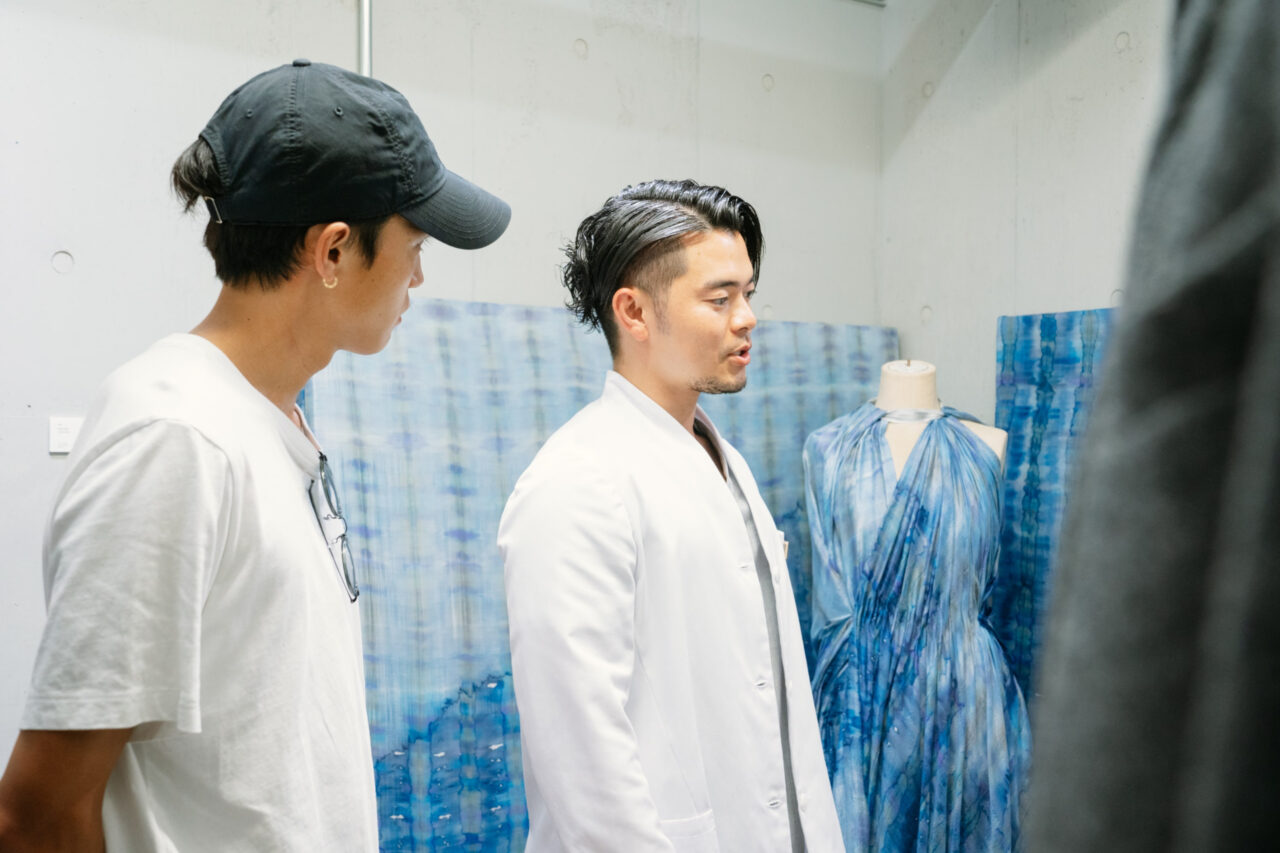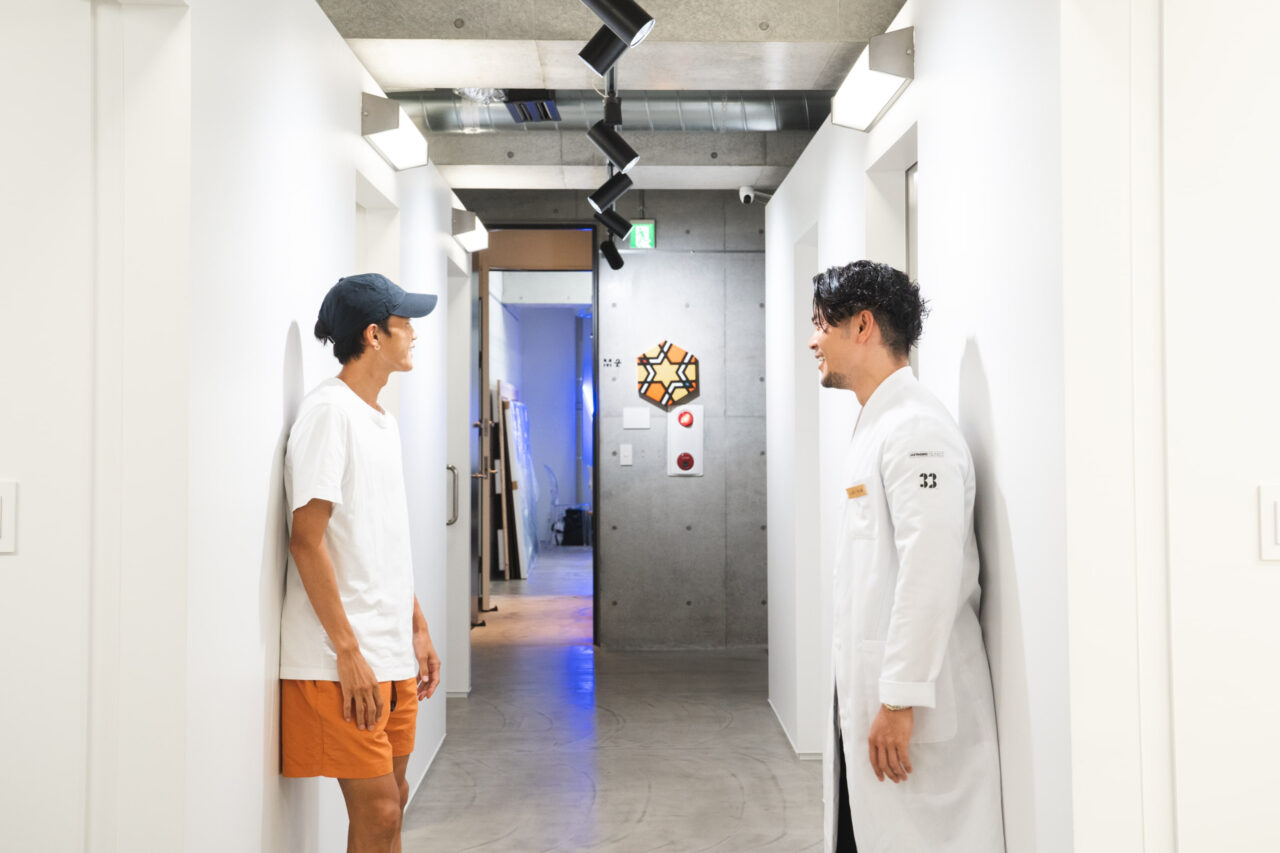Short Film


Who is he?
Osako: Let me start by asking, what do you do?
Michishita: I’m a brain surgeon and I’ve actually just finished a surgery and come back to my clinic. When you hear someone is a “doctor” in Japan, it sounds like a position of authority and you might feel they are far removed from you. But having experienced or faced the deaths of many people, I’ve become keenly aware that there isn’t that much I can do. I’ve mentioned that I see medical care as one of the infrastructures. To be more specific, I think it should be very simple and approachable, like water and electricity. You should have immediate access to care when you’re not feeling well, or something’s bothering you mentally. I’m working to create a mechanism to allow that to happen.


How we met.
Michishita: We have a mutual acquaintance.
Osako: Yes. We met through a mutual acquaintance.
Michishita: He runs a picture frame business. He has extremely deep thoughts, and when I was talking about life and death beyond religion and philosophy, he said “Suguru is a deep thinker and has similar thoughts, so you guys might hit it off well. Why don’t you meet him?” That’s how we met. How many times have we met? I guess this is the third or fourth time, but we’ve talked about a lot of things.
Osako: Yes, a lot of things. When we get drunk, it gets nice and relaxing to talk.
Michishita: Nice and relaxing, haha.


We are both pros in our respective fields. What’s common?
Osako: I don’t know if this is the right way to put it, but I feel there are similarities between pain and death on a basic level. With regard to the state of mind that allows you to stay happy while facing them, although you and I seem to live in very different worlds, we actually have many things in common. The way we think is also similar.
Michishita: Right. When I perform a surgery, it takes six to eight hours on average and sometimes it takes more than twenty. A tiny lapse of concentration can cause a fatal mistake that leads to death, so I get into a zone to perform a detailed surgery. You are a runner and you are in a different field, but you also stay in a zone for a long time and move forward while skillfully coping with various ups and downs. I think we are very similar in this regard, mentally, I mean. It’s like a bamboo leaf floating down a river. It has a set destination and might make a detour or rock back and forth, but it needs to keep moving forward without capsizing.
Osako: Yeah. When I run a marathon, I also get into a zone and need to make a series of judgments. In my case, it’s like “staying afloat nicely all the way.” I move forward naturally, without resisting or fighting. I guess it sounds very sensorial, but I clearly move forward when I’m able to keep afloat.



Current challenges.
Michishita: For me, the biggest challenge is how I face death. In the field of brain surgery, my area of expertise is bypass surgery to connect specific blood vessels. I’m still part of the younger generation, but I handled the largest number of cases in Kanagawa prefecture last year. So just looking at the number of cases, I’ve handled more cases than any doctor at university hospitals. I had a chance to study at Harvard while I was in university and was able to learn first-hand the highest level of medicine in the world. Through that experience, I realized how helpless we are when faced with death, and how whether or not a patient will be able to lead a full and rich life is no longer possible. What crossed my mind was our responsibility over people not being able to die because of the advancement of medicine. Modern medicine is all about making people live. I really question if the time we spend living is truly rich. So how to approach or frame death holistically is a clear challenge I’ve set for myself.
Osako: I’m struck by your choice of words, such as “the time we spend living” and if it’s “truly rich.”



What we care about.
Michishita: I don’t pay too much attention to the industry or stereotypes, which I guess is true for you as well. I’m a very curious person and the doctors around me are open-minded. I feel you are like that too. There are so many worlds out there that I don’t know about, so at the very least, I need to be able to elevate what I have in front of me to the highest level. I also need to raise about three other aspects to be truly unique like no other. I’ve felt this way since I was a teenager. Since my main job is a brain surgeon, performing many surgeries at an early stage in my career to help as many people as possible is my baseline. I think we need to move on to what’s next, while respecting long-time tradition.
Osako: I agree. In my case, I want to raise the game to the next level, and at the same time, I think the way I do it is also important. I wonder if the methods and thinking passed down from the past are necessarily correct. You think you are headed straight for something but sometimes it turns out that it wasn’t actually straight. Everyone practices naturally, but I question level-headedly if the particular method of practice is actually right or precise. I try to think like this consciously every day. I feel you are simple and also complex at the same time. I’m not the type of person who thinks about many things at the same time, so I focus on keeping it simple, and cutting out all the excess.
Michishita: That can be the hardest thing to do.

The reason we call this place (AFRODE) a clinic, not a hospital.
Michishita: In medicine, and probably in sports as well, people in Japan often talk about preventive medicine when it comes to making people healthier and happier. We now have a system where you often go pick up your medicine or have a health checkup. This has a lot to do with health insurance. In order for the health insurance system to generate revenue, it requires people to get tested at the hospital and have a prescription. Medicine is probably the most established subscription model today. Hospitals need to write prescriptions because they can’t make money otherwise. But I think we need to question if it’s the best option for the patient. If you really want to maintain your health, I think the only way is to change your lifestyle, which means everything in your daily life from diet, exercise and mentality. If that’s the case, it’s clear that it goes beyond the realm of hospitals. Even if you take medicine regularly, it won’t be able to keep you healthy and happy forever. You do need to change something. In Japan, people go to organic restaurants for a healthy diet and have personal training for exercise, but there is no connection between them. I see medicine as the core that connects everything. I believe AFRODE is the only place for us to continue to offer better options. I want to provide reliable information through reliable communication.



Our perspectives on contribution.
Michishita: I was working at the Jikei University Hospital until March. Since I left, the number of surgeries I perform has decreased significantly. When I decided to leave Jikei, many people asked “why now,” or “why leave when you are entering the prime of your career.” I guess there are many ways to look at it, and I’m sure that my team and I were able to save many lives through successful surgeries. But when I look back, I wonder how many more lives I’ll be able to save in the rest of my life. Brain surgeons would usually say it’s roughly fifty to a hundred people. Without a doubt, saving the life of the person in front of you is truly valuable. However, when I think about what I can do in my own unique way, I seriously want to save tens of thousands of lives with the time I would spend on that one person. In order to do so, I believe how we think about medicine and its fundamental mechanism needs to change. That’s why I’m doing what I do now. I’m sure you, too, are thinking about something with regard to making a contribution or legacy.
Osako: Yes. When it comes to contribution, I agree with you that what you can do on your own is fairly limited. In track and field, there is a limit to keep improving your records. But I think you can contribute to the potential of future athletes by changing the system or environment. Even if the change is a small dot, I believe it will grow into a circle of power someday. Sugar Elite is a good example. I still don’t know if it’s something I can achieve during my lifetime, but I’m motivated because it’s more meaningful if it brings a big change in fifty or a hundred years from now. When the dots connect and form a circle, I think sports will have power and strength that create a positive force for the future.




